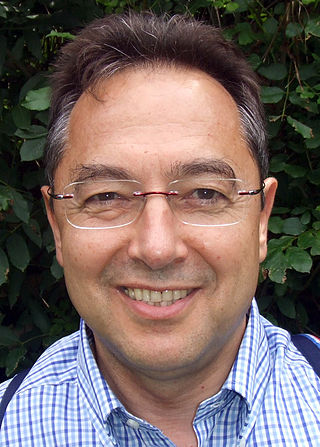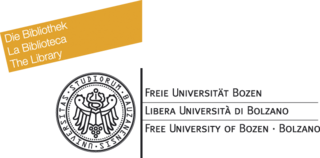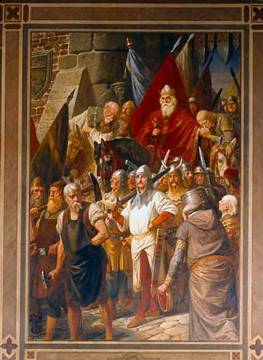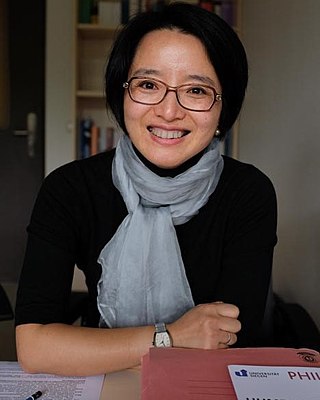
Bolzano is the capital city of the province of South Tyrol in northern Italy. With a population of 108,245, Bolzano is also by far the largest city in South Tyrol and the third largest in historical Tyrol. The greater metro area has about 250,000 inhabitants and is one of the urban centers within the Alps.

The Victory Monument is a monument in Bolzano, northernmost Italy, erected on the personal orders of Benito Mussolini in South Tyrol, which had been annexed from Austria after World War I. The 19 metre wide Victory Gate was designed by architect Marcello Piacentini and substituted the former Austrian Kaiserjäger monument, torn down in 1926–27. Its construction in Fascist style, displaying lictorial pillars, was dedicated to the "Martyrs of World War I".

Hans Köchler is a retired professor of philosophy at the University of Innsbruck, Austria, and president of the International Progress Organization, a non-governmental organization in consultative status with the United Nations. In his general philosophical outlook he is influenced by Husserl and Heidegger, his legal thinking has been shaped by the approach of Kelsen. Köchler has made contributions to phenomenology and philosophical anthropology and has developed a hermeneutics of trans-cultural understanding that has influenced the discourse on the relations between Islam and the West.

The Prince-Bishopric of Brixen was an ecclesiastical principality of the Holy Roman Empire in the present-day northern Italian province of South Tyrol. It should not be confused with the larger Catholic diocese, over which the prince-bishops exercised only the ecclesiastical authority of an ordinary bishop. The bishopric in the Eisack/Isarco valley was established in the 6th century and gradually received more secular powers. It gained imperial immediacy in 1027 and remained an Imperial Estate until 1803, when it was secularised to Tyrol. The diocese, however, existed until 1964, and is now part of the Diocese of Bolzano-Brixen.
Adel Theodor Khoury is a Catholic theologian and historian of Christianity and Islam.
Gerald Steinacher is Professor of History and Hymen Rosenberg Professor of Judaic Studies at the University of Nebraska-Lincoln. He was a Joseph A. Schumpeter Research Fellow at Harvard University during 2010-2011 and in 2009 a visiting scholar at the Center for European Studies at Harvard University. He lectured at the Universities of Innsbruck (Austria), Luzern (Switzerland) and Munich (Germany). In 2006 he was a Center for Advanced Holocaust Studies Fellow at the United States Holocaust Memorial Museum in Washington, DC.

Oskar Peterlini, Lecturer at the Free University of Bozen Bolzano, is a Representative of the German-speaking South Tyrolean Minority in South Tyrol, Italy. He was a member of the Italian Senate in the Italian Parliament from 2001 to 2013, Member of the Regional Parliament of Trentino South Tyrol from 1978 to 1998 and its president from 1988–1998. He was also President of the district of the South Tyrolean Unterland of the South Tyrolean People's Party (SVP) from 2001 to 2010.

The Library of the Free University of Bozen-Bolzano is a university library located in Bozen/Bolzano, South Tyrol, Italy. Established in 1998, the library forms part of the big scientific libraries of South Tyrol, similar to the "Dr. Friedrich Teßmann" library, and is associated with the Free University of Bozen-Bolzano.
Hans Bobek was an Austrian geographer. After his studies in geography at the University of Innsbruck, where Johann Sölch—a pupil of Albrecht Penck in Vienna—was his main teacher, he became professor of geography at the University of Vienna (1951–1971). Bobek is noted for his works on cultural and social geography, urban geography as well as on the regional geography of the Near and Middle East, then primarily known as the "Orient". He was, among others, the author of Iran: Probleme eines unterentwickelten Landes alter Kultur. His theory about rural and urban interactions was called Rentenkapitalismus; another important output was the theory of cultural steps (Kulturstufentheorie).

Under the law of the Holy Roman Empire, a Landfrieden or Landfriede was a contractual waiver of the use of legitimate force, by rulers of specified territories, to assert their own legal claims. This especially affected the right of feuding.

Karl Felix Wolff was a journalist, poet, author and self-taught folklorist of the South Tyrol who collected and published Ladinian legends.

The front of the mountain war between 1915 and 1917 ran from the pass of Stilfser Joch on the Swiss border, over the Ortler and the Adamello mountains to the northern shores of Lake Garda. It continued east of the Etsch then ran over the Pasubio and on to the Sette Comuni. From there the Italian Isonzo armies threatened Austria-Hungary in the rear, which is why it can be described as a two-front war.
The following is a timeline of the history of the city of Bolzano/Bozen in the Trentino-South Tyrol region of Italy.
Joseph Marko is an Austrian legal scholar and political scientist.
Bernd-Christian Funk is an Austrian legal scholar and educator. Funk is a former professor of Constitutional and Administrative Law at the University of Vienna, the dean and academic director of the Sigmund Freud University Vienna Faculty of Law, and one of the governors of the Medical University of Innsbruck.
Theodor "Theo" Öhlinger is an Austrian constitutional scholar and educator. Öhlinger was a member the Austrian Constitutional Court from 1977 to 1989 and a professor of constitutional and administrative law at the University of Vienna from 1974 to 2007. Since 1999, he has been serving as the deputy chairman of the board of trustees of the Vienna Museum of Art History. Öhlinger has published 23 books and more than 350 scholarly articles and appears as a frequent commentator on legal issues in the Austrian news media. Austrian President Alexander van der Bellen called him Austria's "operating system" during the turbulent times of May 2019.

Karl Engisch was a German jurist and a Philosopher of Law. He was described by Hans Joachim Hirsch as one of the "outstanding theorists of criminal justice of the [twentieth] century".

Zhao Jin is a Chinese professor of German linguistics and a scholar in cultural-analytical linguistics.
Gerhard Schricker was a German legal scholar with a focus on intellectual property and competition law. He was a full professor at Ludwig Maximilian University of Munich from 1973 to 2000 and served as Director of the Munich-based Max Planck Institute for Foreign and International Patent, Trademark, and Copyright Law between 1971 and 2003.

Hans Haid was an Austrian folklorist, mountain farmer and dialect poet.











